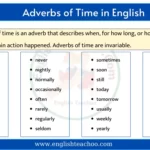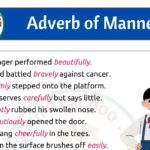Definition of Adverb
An adverb is a word that modifies or simplifies the meaning of a verb, adjective, or another adverb.
Adverbs typically answer questions such as when, where, how, in what way, and to what extent.
Types of Adverbs
The four main types of Adverbs in English are:
- Adverbs of Manner
- Adverbs of Time and Frequency
- Adverbs of Place
- Adverbs of Degree

Adverb of Manner
Adverbs of manner give information about how something happens. Adverbs of manner include: Angrily, sadly, loudly, beautifully, quickly, easily, bravely, etc.
Examples:
- She looked at him sadly.
- She was beautifully dressed.
- The baby is growing quickly.
- I can easily finish it tonight.
- We walked slowly along the road.
Read More: List of Adverbs
Adverbs of Time and Frequency
Adverbs of Time give information about when or for how long something happened. Adverbs of time include: now, soon, recently, today, yesterday, last night, tomorrow, etc.
Examples:
- We are going to a party tonight.
- He is reading a book now.
- I am going to London soon.
- This book was published recently.
- He was drunk last night.
- I read my book all afternoon.
Adverbs of time can also be used to tell us how often an action happens. They determine the frequency of the action. These types of adverbs are also called Adverbs of Frequency. They include: always, often, never, rarely, sometimes, usually, occasionally, etc.
Examples:
- That dog always barks at night.
- How often do the trains come?
- I’ve never heard of that song.
- Children usually like to see cartoons.
- Lions sometimes hunt alone.
Adverbs of Place
An Adverb of place is used to tell us where something happens. They are usually placed after the main verb or after the clause. Adverbs of Place include: above, down, behind, here, there, inside, below, between, around, downstairs, upstairs, everywhere, etc.
Examples:
- They’re waiting for us downstairs.
- She sat down in her chair.
- Wait here until I get back.
- I looked everywhere for my keys.
- The house is north of here.
Many adverbs of place can also be used as prepositions. When we used them as prepositions, they must be followed by a noun.
| Word | Used as an Adverb of place | Used as Preposition |
| inside | You’ll have to play inside today. | I left my key inside my room. |
| around | The kitten was running around. | The earth goes around the sun. |
| over | She fell over and started to cry. | We spread a carpet over the floor. |
Adverbs of Degree
Adverbs of degree are used to express ‘how much‘ (or to what extent) we do something. They can be used before adjectives, verbs, or other adverbs. Adverbs of degree include: very, too, deeply, badly, strongly, thoroughly, hardly, extremely, etc
Examples:
- I deeply regret what I said.
- I strongly advise you not to do this.
- I know very little about him.
- He can hardly afford an apartment.
- We thoroughly enjoyed ourselves.





